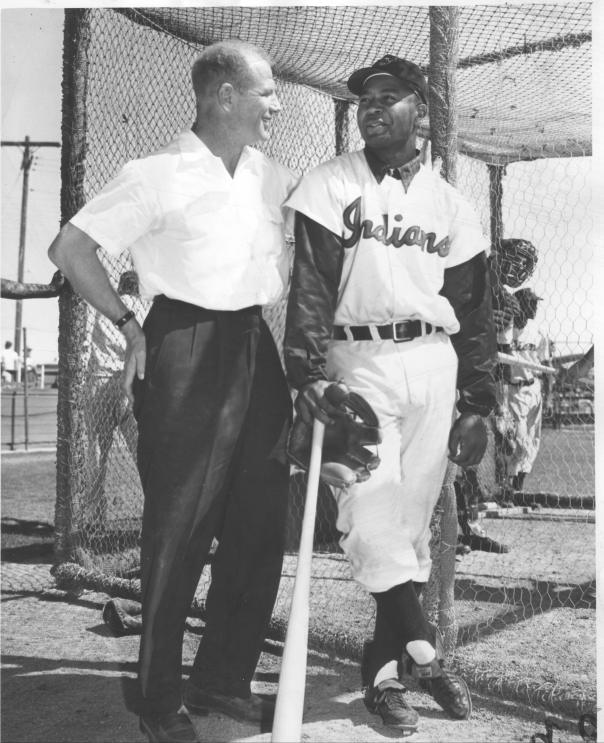
Within months of the Brooklyn Dodgers’ historic signing of Jackie Robinson, then-Cleveland Indians owner Bill Veeck, left, broke the color barrier in Major League Baseball’s American League by signing Larry Doby in July 1947.
BASEBALL MAVERICK/INNOVATOR VEECK
INTEGRATED MLB’S AMERICAN LEAGUE
BY SIGNING LARRY DOBY IN 1947
A visionary who spotted corporate threat
to American culture a half-century ago
By David Maril
The technology changes but one thing stays the same: too many people submit meekly to the forces of corporate marketing.
As we experience another season of politicians masquerading as graduation speakers, I think of what a nice change of pace it would be to have college and high school seniors hear an individual who speaks from the heart and offers an honest point of view to think about.
Someone, for example, like the late Bill Veeck (1914-1986).
I was fortunate to have heard this colorful, radical and imaginative former baseball owner of the St. Louis Browns, Cleveland Indians and Chicago White Sox speak about bucking the trend and remaining a vibrant individual.
Believe me, he made a strong impression many decades ago when I was in college. The Baseball Hall of Famer, who was always battling the establishment, was responsible for starting the integration of the American League by signing Larry Doby in 1947, when he owned the Indians.
Veeck also enraged the stodgy baseball executives of that day by giving the great pitcher Satchel Paige, 42 years old at the time, and black, a chance to play in the big leagues.
Usually struggling financially, Veeck’s teams survived because he was smart, clever and catered to the fans, always introducing a series of bargain giveaways that are still used promotionally by many teams today.
Some, like sending a midget, Eddie Gaedel, up to bat when he owned the Browns, were controversial. Disco Demolition Night, when he owned the White Sox, was a disaster. Most of his promotions, however, were successful and popular.
Veeck, also a successful book author and network radio commentator, spoke to a small group of us at Clark University.
“Stand up, be an individual and don’t let the corporate world take advantage of you,” he told us with a mischievous smile.
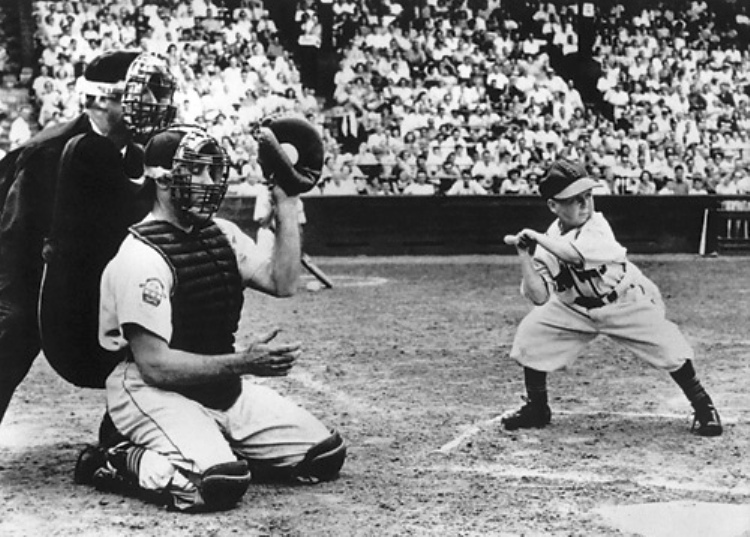
Midget Eddie Gaedel pinch-hits for St. Louis Browns in 1951, drawing a walk on four pitches. It was team owner Bill Veeck’s best-known stunt.
Veeck was quite an interesting figure standing on the stage. His right leg had been crushed when he was serving in an artillery unit in World War II and eventually was amputated.
This never got Veeck down. Fitted with a number of wooden legs over the years, he literally made light of his situation, carving an ashtray into the wood for when he smoked.
Like Ted Williams, Veeck never wore ties and was famous for open-necked sport shirts.
“You know what I do when I get any of those subscription and product offers in the mail, that I never asked for, with returnable envelopes?” he asked us.
“I don’t throw them away. I send them back with nothing in the envelope. The company has to pay for the postage and someone has to open the envelope up. This is a way of getting back at them.”
Veeck, as usual, was being a contrarian, and, more importantly a visionary, anticipating what was going to grow even worse in the decades ahead.
This was before telemarketing and the need for Do Not Call lists. It was long before the Internet and businesses like Google were profiling us through our web searches to spam us with individualized advertising.
It was also years before companies began merging with each other and it became impossible to reach a live human being when you call to complain about a product.
Veeck cared so much about communicating directly with the public, he actually lived in an apartment at the stadium, when he owned the Browns and Indians. He was obsessed with talking to his team’s fans and hearing what they had to say.
He joked in his book Veeck As In Wreck that when he first bought the Indians, who were struggling to fill their huge stadium, he answered the team’s phone and a fan asked what time the game was that night. Veeck’s answer was, “What time can you get here?”
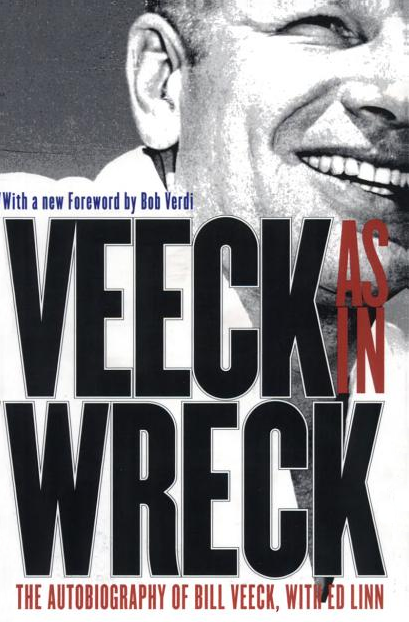
The title of Bill Veeck’s 1962 autobiography gives a clue as to the correct pronunciation of his last name.
It wasn’t long before the Indians were breaking attendance records.
If Veeck were around today, it’s doubtful he would accept being a telephone prisoner sentenced to 15 minutes on hold when calling a business.
Here are a few steps and some strategy I think Veeck would have approved of to turn the tables today:
First thing, as soon as a computerized voice answers your phone call to a business and lectures you on how much easier it would be to use the company’s website, start hitting the O button. Keep hitting O while the voice gives you 15 different options to get to the next recording.
At first, the computer voice will insist it doesn’t recognize your response. Usually, that’s just a trick to herd you back into the mainstream so you’ll be forced to spend several minutes navigating through a maze of stupid recorded questions and useless options.
With most mechanized phone systems, however, if you keep pressing the O enough, you’ll finally reach a person at the other end of the line.
The problem is, too many companies figure that the tougher they make it to reach one of their employees on the phone, the fewer they’ll have to hire and pay to deal with the public.
When you run into an especially stubborn and user-unfriendly company, here are some tips to teach them a lesson:
When you finally reach a live voice, tell them you sympathize with the fact they have to take the brunt of the complaints from the impatient public. Next, ask politely, but firmly, to speak to an upper-management person.
When you do finally get switched to a supervisor, inform that person the call may be monitored for quality control. Before they respond, ask if they’d mind being put on hold. After they agree, walk away from the phone for a few minutes.
When you get back on the phone, interrupt them in mid-sentence and tell them your computer system has just crashed and they have to go on hold again for a minute.
When you return, ask for the last four digits of their Social Security number and the middle name of their neighbor’s pet dog so you can be sure you are actually talking to the right management person.
If they can’t answer, tell them they have to go back on hold again while you confer with your supervisor.
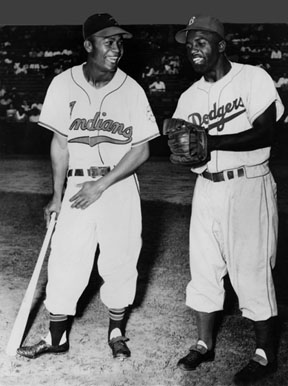
Larry Doby, left, and Jackie Robinson were the first two African-Americans to play Major League Baseball (1947).
When you’ve finished your business, have them answer questions for a survey you are taking.
Did they feel you were courteous and knew what questions to ask? Were you familiar with the questions asked and helpful to them in coming up with the right answers?
Before hanging up, ask them if there’s anything else you can do for them today.
Here are a few other ways of fighting back against the segment of corporate America that wants to own you but not hear what you have to say:
![]() When a stadium or arena sells its name to a corporation or business sponsor, never use that name when referring to the place.
When a stadium or arena sells its name to a corporation or business sponsor, never use that name when referring to the place.
For example, I refuse to mention the bank that has just added on a 10-year $60-million deal with the Ravens to have its name kept on the stadium that the taxpayers of Maryland built with our own money.
As far as I’m concerned, it’s either Maryland Taxpayers Stadium or Ravens Park.
The Orioles, in fact, deserve a lot of credit for not cashing in on this practice and ruining the name of Oriole Park at Camden Yards.
![]() Another idea is to retire from your duties as a human billboard by no longer wearing shoes and clothes with logos advertising the company that produced them. If you wear the product, cover up the logo.
Another idea is to retire from your duties as a human billboard by no longer wearing shoes and clothes with logos advertising the company that produced them. If you wear the product, cover up the logo.
![]() How about getting into the routine for five minutes every day of doing searches on Google and Yahoo for how to take legal action against Internet search companies. This should give them something to think about when they are trying to harass or brainwash you with specialized advertising.
How about getting into the routine for five minutes every day of doing searches on Google and Yahoo for how to take legal action against Internet search companies. This should give them something to think about when they are trying to harass or brainwash you with specialized advertising.
![]() Finally, next time you get an unwanted dinnertime or evening call from a marketer, ask them for their phone number so you can call them in the middle of eating or when they are unwinding at the end of a long day.
Finally, next time you get an unwanted dinnertime or evening call from a marketer, ask them for their phone number so you can call them in the middle of eating or when they are unwinding at the end of a long day.
I am sure Bill Veeck would have been able to add a few more battle plans to fight back against the corporate assault.
He was humorous and entertaining but also a wise philosopher. One of his most accurate and telling comments was that baseball had to be the greatest game in the world because it has survived the people who run it.
Too bad he wasn’t able to move the Browns himself to Baltimore. The stuffy, corporate, shortsighted owners and commissioner forced him to sell the team before it moved here in 1954.
With Veeck — who spent quite a bit of time on the Eastern Shore — around, the Orioles might have set a few attendance records in the middle and late 1950s.
To be sure, Baltimoreans would have had a few laughs and a good time as he encouraged people to stand up and be free-thinking individuals.
davidmaril@voiceofbaltimore.org
“Inside Pitch” is a weekly opinion column written for Voice of Baltimore by David Maril.
EDITOR’S NOTE:
![]() Three-foot-seven-inch Eddie Gaedel wore the number “1/8” when Bill Veeck sent him up to bat as a pinch hitter for the Browns in the first inning of a game against the Detroit Tigers in 1951.
Three-foot-seven-inch Eddie Gaedel wore the number “1/8” when Bill Veeck sent him up to bat as a pinch hitter for the Browns in the first inning of a game against the Detroit Tigers in 1951.
After walking on four pitches, Gaedel was replaced by a pinch-runner at first base, and received a standing ovation from the crowd.
His No. 1/8 jersey is preserved in the Baseball Hall of Fame at Cooperstown.
![]() Among his many distinctions, Satchel Paige holds the record as the oldest rookie — age 42 — in Major League Baseball history.
Among his many distinctions, Satchel Paige holds the record as the oldest rookie — age 42 — in Major League Baseball history.
![]() When the St. Louis Browns moved to Baltimore in 1954, Bill Veeck — who was often referred to as “Sport Shirt Bill” — was originally designated the majority shareholder, in partnership with a minority consortium put together by attorney Clarence Miles, founder of the Baltimore law firm Miles & Stockbridge.
When the St. Louis Browns moved to Baltimore in 1954, Bill Veeck — who was often referred to as “Sport Shirt Bill” — was originally designated the majority shareholder, in partnership with a minority consortium put together by attorney Clarence Miles, founder of the Baltimore law firm Miles & Stockbridge.
However a majority of American League team owners, led by New York Yankees co-owner Del Webb, wanted Veeck out of baseball and refused to approve the sale of the team to Baltimore if he was included.
With the help of legendary Mayor Thomas J. D’Alesandro Jr., Miles obtained enough financial support from National Boh brewer Jerold Hoffberger, investment banker Joseph Iglehart, and real estate developer James Keelty to buy out Veeck’s interest for $2.5 million, and the sale of the team and subsequent move to Baltimore — to be renamed Orioles — was approved.
Veeck returned to baseball however in 1959, when he became head of a group that purchased a controlling interest in the Chicago White Sox, who went on to win their first pennant in 40 years.
Under his stewardship, Comiskey park installed the first “exploding scoreboard” in the major leagues, with electrical and sound effects, and shooting fireworks whenever a White Sox player hit a home run.
The team also became the first to add players’ surnames on the back of their uniforms, a practice now standard by most baseball and football teams at virtually all levels of play.
CHECK OUT LAST WEEK’S “INSIDE PITCH” COLUMN: click here
…and read archived Dave Maril columns by clicking here.
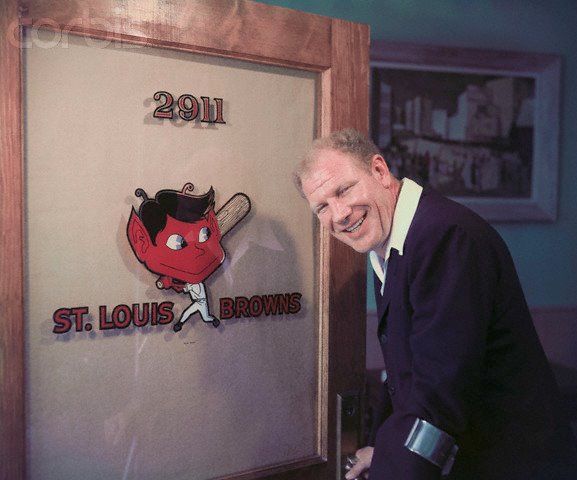






June 2nd, 2014 - 12:01 AM
[…] Voice of Baltimore by David Maril. CHECK OUT LAST WEEK’S “INSIDE PITCH” COLUMN: click here …and read archived Dave Maril columns by clicking here. […]